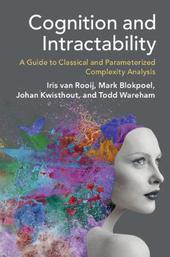
|
Cognition and Intractability: A Guide to Classical and Parameterized Complexity Analysis
Paperback / softback
Main Details
| Title |
Cognition and Intractability: A Guide to Classical and Parameterized Complexity Analysis
|
| Authors and Contributors |
By (author) Iris van Rooij
|
|
By (author) Mark Blokpoel
|
|
By (author) Johan Kwisthout
|
|
By (author) Todd Wareham
|
| Physical Properties |
| Format:Paperback / softback | | Pages:374 | | Dimensions(mm): Height 228,Width 151 |
|
| Category/Genre | Maths for scientists
Neurosciences |
|---|
| ISBN/Barcode |
9781108728973
|
| Classifications | Dewey:511.352 |
|---|
| Audience | | Undergraduate | | Postgraduate, Research & Scholarly | |
|---|
| Illustrations |
Worked examples or Exercises; 19 Tables, unspecified; 67 Line drawings, unspecified
|
|
Publishing Details |
| Publisher |
Cambridge University Press
|
| Imprint |
Cambridge University Press
|
| Publication Date |
25 April 2019 |
| Publication Country |
United Kingdom
|
Description
Intractability is a growing concern across the cognitive sciences: while many models of cognition can describe and predict human behavior in the lab, it remains unclear how these models can scale to situations of real-world complexity. Cognition and Intractability is the first book to provide an accessible introduction to computational complexity analysis and its application to questions of intractability in cognitive science. Covering both classical and parameterized complexity analysis, it introduces the mathematical concepts and proof techniques that can be used to test one's intuition of (in)tractability. It also describes how these tools can be applied to cognitive modeling to deal with intractability, and its ramifications, in a systematic way. Aimed at students and researchers in philosophy, cognitive neuroscience, psychology, artificial intelligence, and linguistics who want to build a firm understanding of intractability and its implications in their modeling work, it is an ideal resource for teaching or self-study.
Author Biography
Iris van Rooij is a psychologist and cognitive scientist based at the Donders Institute for Brain, Cognition and Behaviour and the School for Psychology and Artificial Intelligence at Radboud Universiteit Nijmegen, the Netherlands. Mark Blokpoel is a computational cognitive scientist at the Donders Institute for Brain, Cognition and Behaviour at Radboud Universiteit Nijmegen, the Netherlands. Johan Kwisthout is a computer scientist at the Donders Institute for Brain, Cognition and Behaviour and the School for Psychology and Artificial Intelligence at Radboud Universiteit Nijmegen, the Netherlands. Todd Wareham is a computer scientist in the Department of Computer Science at Memorial University of Newfoundland, Canada.
Reviews'Computational complexity has long been the elephant in the room in cognitive science. Researchers, including myself, blithely propose models that, if taken literally, would imply the brain can solve computational problems that are known to be intractable. This excellent introduction to both the technical results and their cognitive relevance should alert students and researchers to these pressing questions.' Nick Chater, University of Warwick 'Cognitive science and algorithms and complexity research are converging: mathematically speaking, there is a revolution in the cognitive models and tools available, while multivariate (parameterized) algorithmics are essential to understanding them. As our growing awareness of how natural systems algorithmically process information leads to intellectual flows in both directions, the insights in this book are highly useful to students and researchers in both fields.' Michael Fellows, University of Bergen, Norway 'Current theories in cognitive science think of mental processes as computational, but they rarely provide rigorous analysis of the relevant computations. Cognition and Intractability applies computational complexity theory to the kinds of inference that are important for human thinking. The results are mathematically elegant, pedagogically helpful, and very useful for understanding the kinds of computational processes that minds use.' Paul Thagard, University of Waterloo, Canada
|